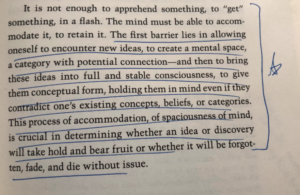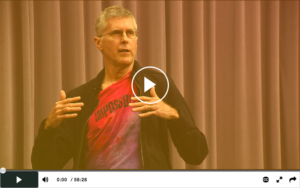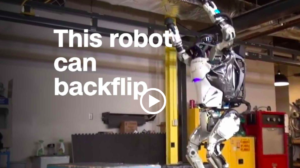When thinking about 2017, the most obvious trend to talk about is cryptocurrency and the blockchain. And it’s really interesting because regular people are making tons of money by way of a transformational technology, yet most people have no idea what it is or why it’s important. I’ve written about it here on VIC a number of times, but many of you have told me you still don’t get it. So with this year-end post, I will attempt to rectify my mistake and start at square one.
Business & Money
So what is bitcoin and what is the blockchain? I’ll stay away from technical details because it honestly is just not that important for everyone to understand (plus I don’t understand it in great detail). Similarly, I’d bet that many of you have no idea how the internet works from a technical perspective, but you have no problem understanding why it is so important. So let’s start there.
The central idea to understand here is trust. If you think back to the origin of trade and “money,” you basically start out with a barter system. If you live in a small tribe or group of just a handful of individuals, it’s easy to acquire some milk by trading some grain. You give me a few gallons and I’ll trade you a few bushels from my harvest. Pretty straight forward and no need for much trust and security. I know who you are and I can look at the milk and smell it to make sure if’s not spoiled. In order to keep track of these “transactions,” I can just write them down in a notebook that says on such and such date, we traded such and such items. Everything is listed there in one neat column.
When the groups started getting larger, and the items being traded more numerous, the simple barter system started to break. If my farm has grown in size and I want to sell grain to the entire village, it doesn’t make sense to trade different items with everyone and write it all in a notebook. You need a means of exchange, or “money,” in order to transact in an efficient manner. Everyone can use the same beads, shells, or coins to buy and sell whatever they need. Additionally, with a much larger number of transactions to keep track of, my simple one-column notebook entries would be hard to manage. So now I start to keep track of things in two columns, credits and debits. In the milk example, I would add a debit for the cash spent, then a credit for my new gallons of milk (enter double-entry bookkeeping).
Another word for my notebook in the above examples would be “ledger,” the record of all transactions. And that system worked great for a long time, until it didn’t. The glaring problem was that it wasn’t very hard to cheat the system. With only one party holding the ledger, it’s easy to cheat. Simply erase an entry here, or add a 0 there, and there’s no way to prove that something’s amiss.
So as things continued to grow and get more complex, our answer to this was independent 3rd parties that would manage the ledgers for everyone else. Enter banks, brokerages, insurers, accounting firms, and the like. But when you think about it, the problem still persists. A bank is just one company, so you still have the trust issue and the single point of failure, albeit a bigger one.
So what if, instead of one bank tracking credits & debits to your account, what if all of your transactions could be independently verified by 5,000 different parties all across the globe. And for a transaction to be verified, there would need to be a majority consensus across the entire network. Even if you bribed one party to erase an entry, that ledger would be out of sync with the other 4,999, so the majority consensus would remain accurate. It becomes much harder to manipulate this system when the ledger is distributed across so many independent participants.
That’s what bitcoin and the Bitcoin blockchain bring to the table. A distributed ledger system that allows for transactions between non-trusted parties, without the need for anything to be verified by financial institutions or 3rd parties. There are lots of independent parties holding copies of the same digital ledger, and it’s a lot harder to compromise a large number of parties than it is to compromise one.
Hopefully that makes some sense without getting into the weeds.
Human Progress
So why is this technology so transformative and so important for the progress of humanity? Using the US dollar and banking institutions seems to work fairly well. You can easily open an account, transfer funds, transact with merchants, and do basically anything else you need to do with your FDIC insured dollars. However, you have to realize that as one of 300 million Americans, you’re thinking is incredibly biased. As the most privileged 5% of the world’s population, you’re completely insulated from things that most people experience.
If you want to think about the average consumer in the world, that’s probably closer to a Chinese male in his mid-twenties. And in China you have communism, corrupt governments, dictators, totalitarian rule, and serious capital controls. That’s a very different picture.
Or maybe you hail from Greece. In 2013, they had FDIC insurance for banks deposits as well. Then one day the banks closed on a Wednesday (not sure if that was the actual day), and reopened on the following Monday to a different version of reality. 20% of money had evaporated while the banks were closed, and even when the banks reopened there were withdrawal limits. What about the FDIC insurance? What insurance? Never happened. Let’s not talk about that.
Or what about what happened with Julian Assange and WikiLeaks in the same year. Because the US government was not in agreement with what Assange and his crew were up to, they basically coerced Visa, MasterCard, Amex, PayPal and all of the major payment providers to cut off WikiLeaks from the global financial system. In other words, WikiLeaks was basically deemed guilty until proven otherwise without any conviction or due process. This was a complete perversion of our judicial system. Ironically, WikiLeaks moved to bitcoin as a result and has now made a 50,000x return on their investment.
Global financial crisis anyone? How many examples do you need of financial institutions and governments behaving badly and betraying our trust before you realize that the current system is broken?
The reality is that 90% of the world’s population doesn’t have access to the financial system in the way that US citizens do. 2.5 billion people have no access to banking at all. Another 4 billion are what we refer to as “under-banked.”
What we need is a system where governments and large financial insinuations can’t rig the game. Can’t print money whenever it suits them.
What we basically need is the separation of state and money in the same way that we currently have a separation of church and state. It’s a no brainer why the separation of church and state makes sense. The Crusades, WWII, Islamic Terrorism…. examples of religion perverting politics and politics perverting religion are innumerable.
We’ve arrived at a point where the same is true of money. It has become a system of mass surveillance and control. Financial institutions, payment processors, clearing houses, all of these are political by nature. In order to operate, these companies have made a bargain with governments that they must do whatever they say if they wish to continue operations. It’s not that these institutions can be manipulated or coerced, it is that they MUST.
And what’s really exciting is that we all get to witness this tipping point during our lifetimes. I can’t see how this technology doesn’t fundamentally change things. There’s no turning back.
Philosophy
Of course, it can’t all be rainbows and butterflies. Blockchain technology is far from perfect in its current instantiation, and will surely undergo many iterations before we get it right. Again, I’ll stay away from the technical limitations, in favor of touching on the philosophical.
The one I’m thinking most about of late is the issue of anonymity. People behave poorly when they’re anonymous. The fact is simple and true.
Social networking is a great example. Some of you may have heard of the anonymous and localized social network called Yik Yak back in 2013. It was largely used at high schools and universities and exploded to 1.8 million downloads in a few months. But the dirty underbelly of the app quickly took center stage. Because there was no real identity tied to profiles, the app quickly went from friendly social network to ground zero for bullying, hate space, and threats of violence. This is a big reason why Facebook requires real names and real pictures to create a profile.
When large groups of people congregate together for protests, to celebrate big wins in sports, or any other reason, these events often turn violent and unruly because people lose the sense of individual identity in favor of the crowd’s.
When people rob banks or commit other crimes, they often wear masks. The feeling of anonymity empowers people to do things that they wouldn’t otherwise do.
India’s president, Narendra Modi, recently removed the largest bills from circulation to cut down on tax evasion and to eliminate payments to fund terrorism & government bribes.
When people buy drugs, guns, or other people, they use cash because it’s anonymous and untraceable.
It’s an ugly fact, but a true one. Anonymity breeds bad behavior. Not from everyone, but from a lot of people and organizations.
If we move money to a truly private and untraceable protocol (e.g. Monero), I’m not so sure about the future of that system. Would you pay your taxes if there was no way to prove how much money you made or no way to enforce it?
Don’t answer that.
My Latest Discovery
Shortcomings aside, these are exciting times. There’s ton’s of noise and coverage about the leading protocols (Bitcoin, Ethereum, LiteCoin, Ripple, ZCash, etc), but there are tons of other really exciting projects out there.
One that I find especially interesting is Augur. Augur is a decentralized prediction market that’s built on top of the Ethereum network. The most obvious application is betting. You can make a wager on any future event, as long as someone in the world is willing to take the other side of that bet and the outcome is publicly verifiable. Now gambling is fun, exciting, and there’s a big market (~$240 billion in the US), but this application is also somewhat short-sighted.
With Augur, you could basically create a futures market for anything. Today we have future’s markets for commodities and financial instruments. For example, if you grow corn, and you sell a pound of corn for $10 to your customers, you’ll want that revenue to remain flat and predictable. So you could buy a futures contract that says if the price goes to $5, you will still get your $10 and the investor pays the difference. If the price goes to $15, then you would only get the $10 and the investor would keep the additional profits. So it’s pretty obvious and straightforward why futures contracts make sense.
But for many things, there are no futures markets. For example, what if you decide to work for the Trump Whitehouse. If he stays in office, your future is pretty bright. But if he’s impeached, your political career might be over. So perhaps you might want to hedge that bet by wagering some amount that he’ll be impeached. And of course, no one would know about it.
What about foreign stock markets? Currently, as an American, I have no exposure to foreign markets (unless there is an American Depository Receipt [ADR] or something similar). With Augur, you might bet on the appreciation of a foreign security.
Or what about access to private markets. If you have a ton of conviction, you might bet on monthly active users, revenue numbers, or the IPO price for Uber.
So think Vegas + DraftKings/FanDuel + futures markets + anything else you can imagine.
I’ll say it again. These are exciting times!!
It’s a Wrap!
I hope this issue was somewhat useful and that 2017 was good to you. I urge you to spend some time in deep reflection about the past year. I imagine there were a few things that didn’t go as planned, people you grew apart from, and less than ideal circumstances. I imagine there were also a ton of reasons to smile and be grateful. In your reflections, look at those two categories, and think about the actions or events that brought both about. You don’t always have control over outcomes, but you do have control over inputs. Focus on the areas you have control over, and that’s all you can really do. Falcon speed in 2018! (Falcon’s are the fastest creatures on the planet and their existence is provable)








